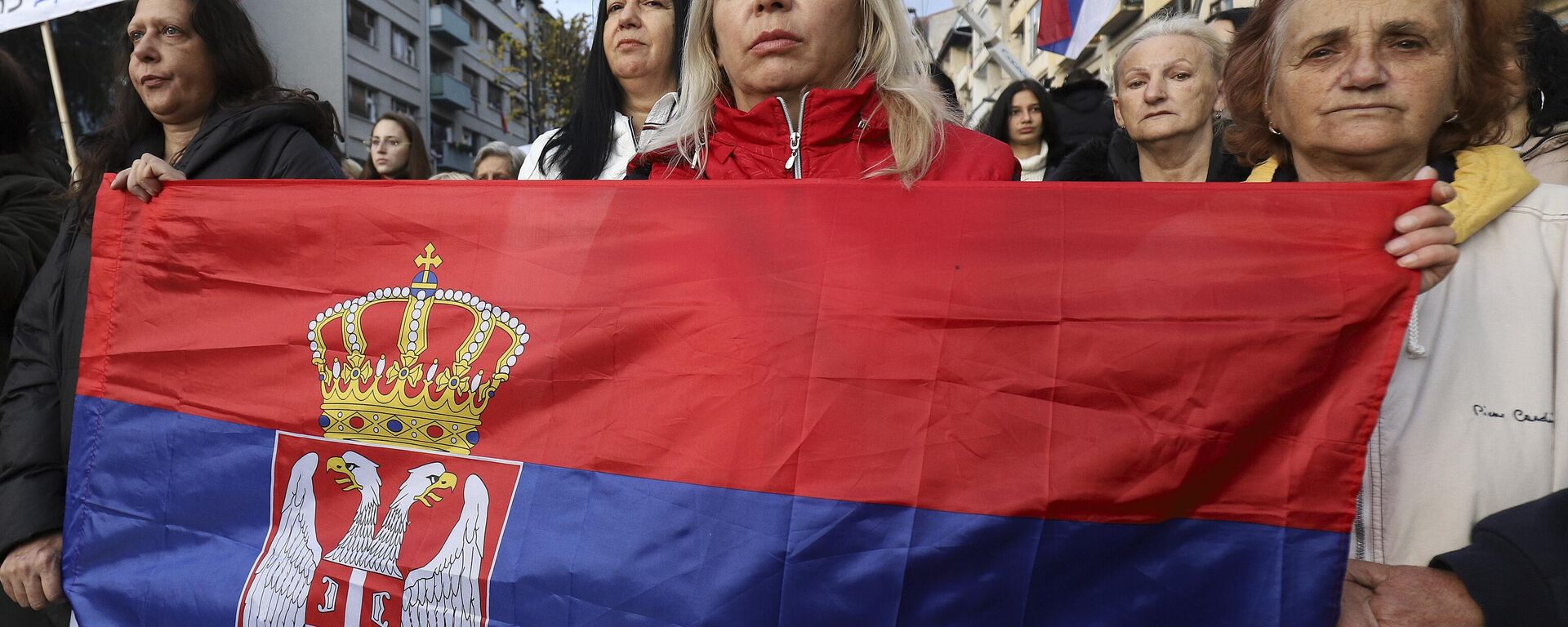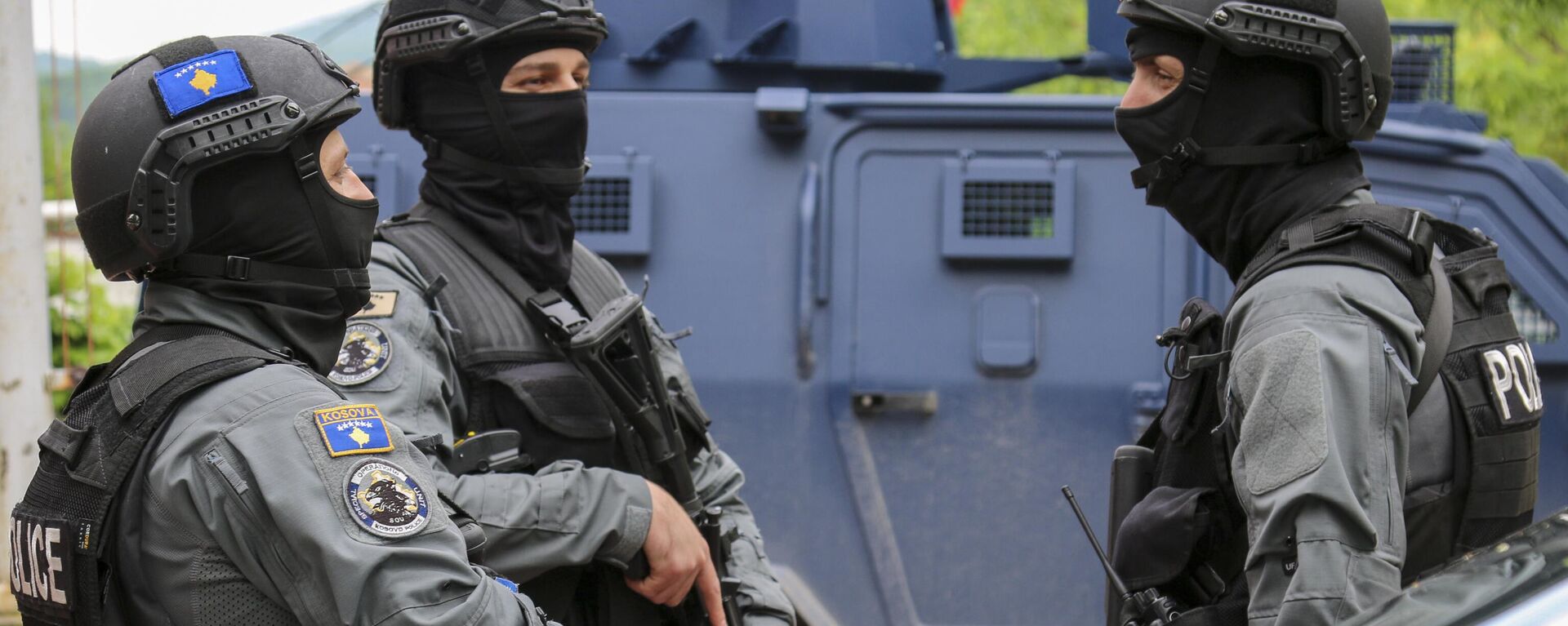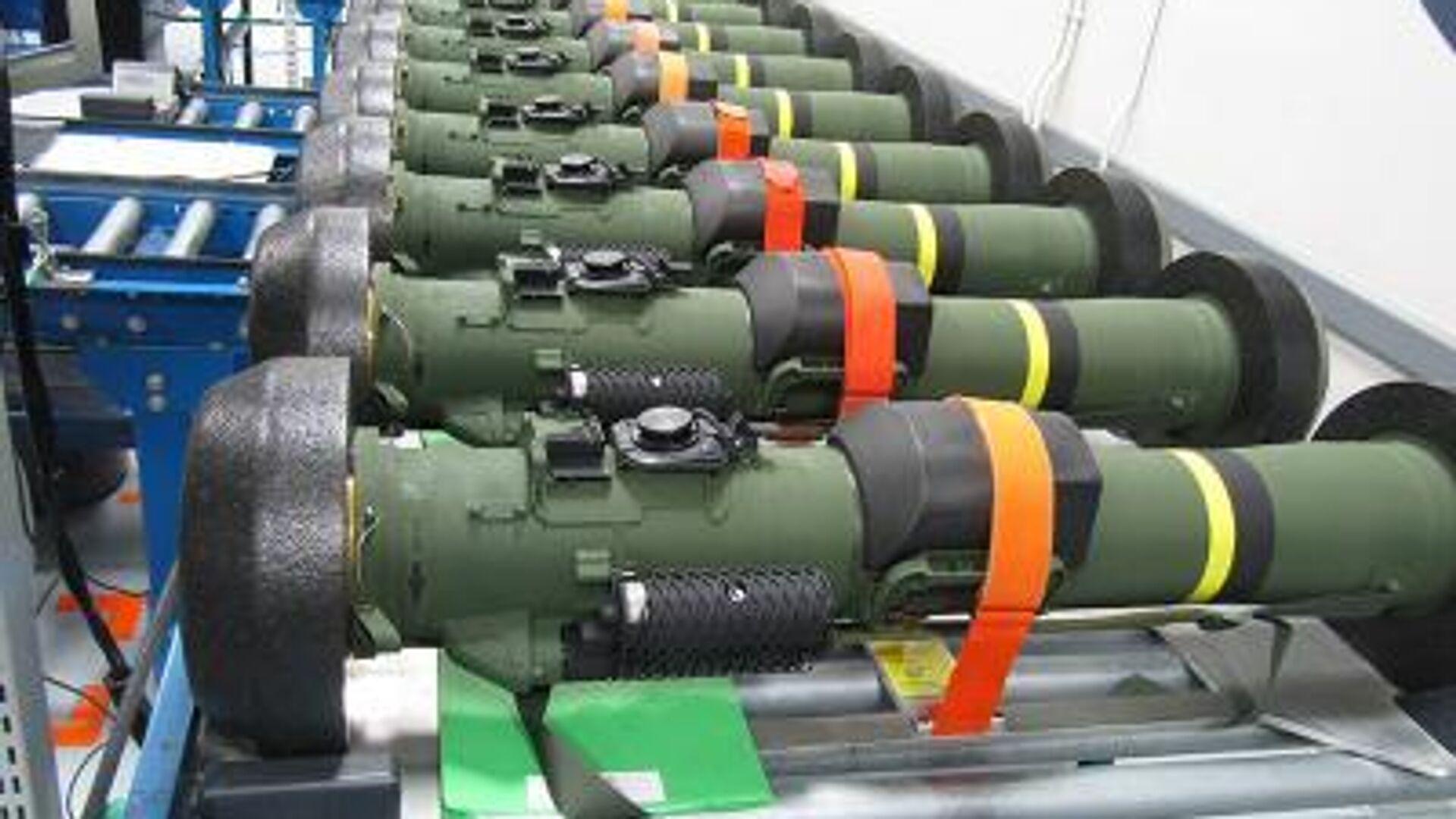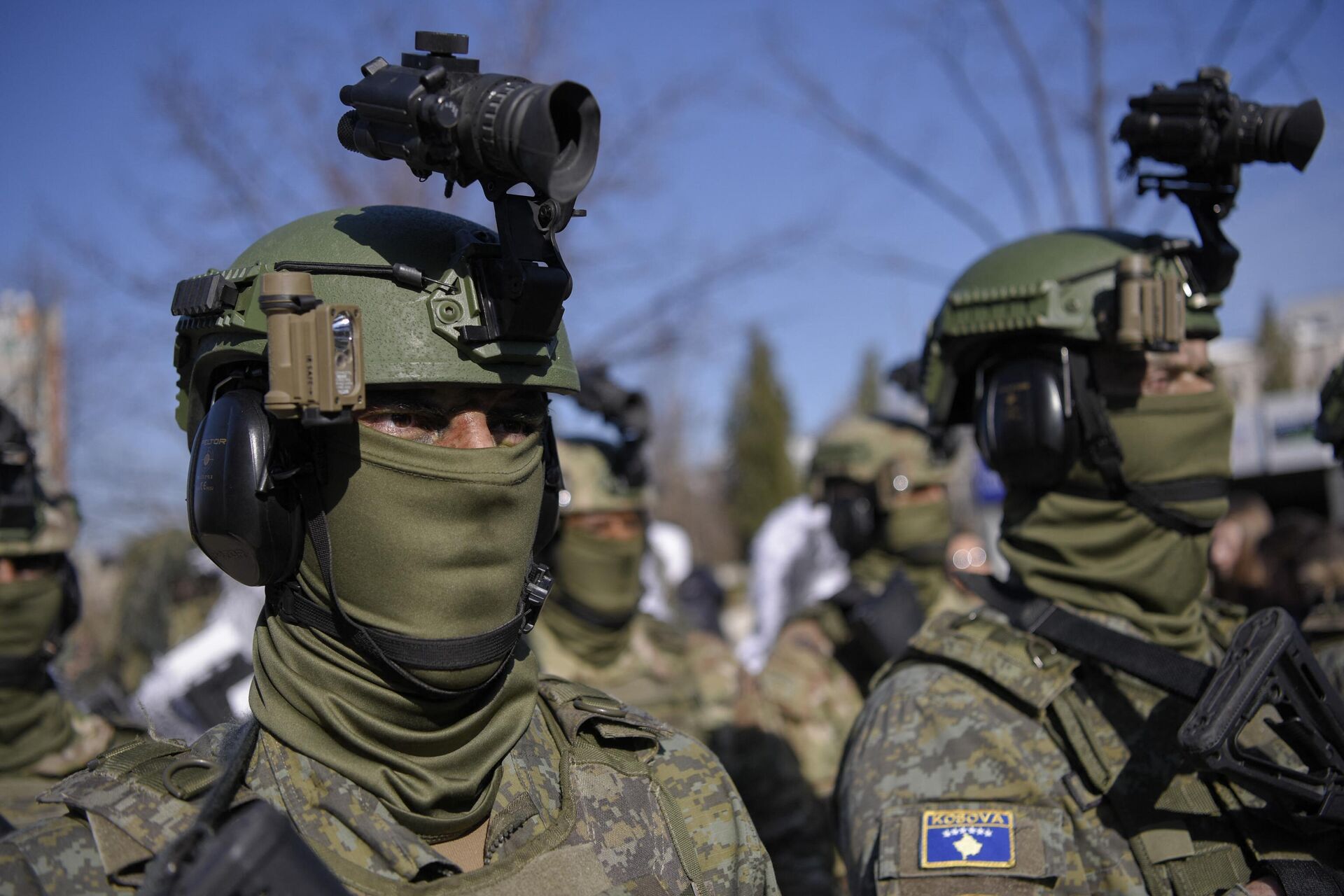https://sputnikglobe.com/20240118/us-sending-javelin-anti-tank-missiles-to-kosovo-in-attempt-to-set-balkans-on-fire-1116249490.html
US Sending Javelin Anti-Tank Missiles to Kosovo in Attempt to Set Balkans on Fire
US Sending Javelin Anti-Tank Missiles to Kosovo in Attempt to Set Balkans on Fire
Sputnik International
The latest round of tensions between Belgrade and breakaway authorities in Kosovo began rising after Pristina riled up ethnic Serbs living in the region’s north by banning Serbia-issued license plates, followed by a push to install unelected ethnic Albanian mayors in Serb-majority settlements.
2024-01-18T14:22+0000
2024-01-18T14:22+0000
2024-01-18T14:22+0000
world
nato
state department
pristina
kosovo
serbia
aleksandar vucic
javelin
humvee
camp bondsteel
https://cdn1.img.sputnikglobe.com/img/07e6/05/11/1095581882_0:38:400:263_1920x0_80_0_0_b1a800aab04ec7c536a1274e896457b3.jpg
The State Department has approved the delivery of $75 million-worth of Javelin anti-tank missiles to the breakaway Serbian region of Kosovo, with the move coming amid rising regional tensions and an ongoing US push to destabilize the Balkan nation.Kosovar separatist authorities expect to receive some 24 Javelin launchers and 246 missiles in total. Serbian President Aleksandar Vucic called the planned transfer a “great disappointment for Serbia” but said Belgrade will still try to “work on preserving Serbian-American relations.”The breakaway is also home to Camp Bondsteel, the US and NATO’s largest military base in the Balkans, and the alliance maintains a 4,500+ troop-strong ‘peacekeeping force’ in the territory known as Kosovo Force, which took part in street clashes with local ethnic Serb residents last year.Javelins are expected to help transform the ‘Kosovo Security Force’ into a full-fledged military, with the breakaway’s self-proclaimed president, Vjosa Osmani, announcing last week that Kosovo is looking to “bring [its] security forces into line with NATO standards,” and acquire other, unspecified weapons from the alliance in the future.Serbia has pointed to the illegality of attempts to create a Kosovar army under UN Security Council Resolution 1244 of June 10, 1999, which also required NATO and its allies to safeguard the “sovereignty and territorial integrity of the Federal Republic of Yugoslavia” – a commitment broken with Kosovo’s 2008 NATO-backed declaration of independence.Tensions in Kosovo began to escalate in mid-2022 after Pristina tried to force Serbs living in the region to get Kosovo-issued license plate as a pretext for a series of discriminatory measures against the minority. Last May, clashes erupted after Pristina forcibly installed new ethnic Albanian mayors in several northern cities after municipal elections boycotted by Serbs. Over 50 Serb protests and 30 NATO troops were injured.In September 2023, armed clashes were reported between Serbs and Kosovar police, with three Serbs killed and six others detained. Moscow called the incident a “direct and immediate consequence” of the Kosovo government’s efforts to “incite the conflict and clear the territory of the region from the Serbs.”Kosovo today is mostly populated by ethnic Albanians, who make up over 90 percent of the breakaway's population, with Serbs residing in areas of the region's north close to the rest of Serbia. The territory's ethnic Serb population was cut in half over the past three decades in a series of ethnic cleansing campaigns and pogroms by Kosovar Albanian militants backed by NATO, with a population of about 194,000 Serbs in 1991 dropping to about 100,000 today. Kosovo has a special significance to Serbs, with the 1389 Battle of Kosovo, where Serb Prince Lazar managed to hold off against a numerically superior Ottoman army, helping to crystalize Serbian national identity. The region also once contained many of Serbia's oldest Orthodox Churches (over 150 of which were destroyed between 1999 and 2004).
https://sputnikglobe.com/20230107/which-countries-dont-recognize-kosovo-and-what-are-their-reasons-1106115420.html
https://sputnikglobe.com/20230925/direct-threat-of-resumption-of-ethnic-cleansing-in-kosovo-exists---russian-foreign-ministry-1113661030.html
pristina
kosovo
serbia
Sputnik International
feedback@sputniknews.com
+74956456601
MIA „Rosiya Segodnya“
2024
News
en_EN
Sputnik International
feedback@sputniknews.com
+74956456601
MIA „Rosiya Segodnya“
Sputnik International
feedback@sputniknews.com
+74956456601
MIA „Rosiya Segodnya“
why is us militarizing kosovo, how is us trying to set balkans on fire, is there war in kosovo, who sends arms to kosovo, kosovo-serbia updates
why is us militarizing kosovo, how is us trying to set balkans on fire, is there war in kosovo, who sends arms to kosovo, kosovo-serbia updates
US Sending Javelin Anti-Tank Missiles to Kosovo in Attempt to Set Balkans on Fire
The latest round of tensions between Belgrade and breakaway authorities in Kosovo began rising after Pristina riled up ethnic Serbs living in the region’s north by banning Serbia-issued license plates, followed by a push to install unelected ethnic Albanian mayors in Serb-majority settlements.
The State Department has approved the delivery of $75 million-worth of Javelin anti-tank missiles to the breakaway Serbian region of Kosovo, with the move coming amid rising regional tensions and an ongoing US push to destabilize the Balkan nation.
“All these systems are acquired to establish sufficient capacity for Kosovo to defend itself in the event of an invasion – or any other threat,” Kosovo defense minister Ejup Maqedonci
told Bloomberg on Wednesday.
Maqedonci did not elaborate how Serbia could “threaten” to “invade” its own province – which unilaterally proclaimed independence in 2008, nine years after Kosovo’s occupation by NATO in 1999 following a 78-day bombing campaign targeting Yugoslavia. Serbia and dozens of countries around the world, including Russia, never recognized Kosovo’s 'independence'.

7 January 2023, 17:19 GMT
Kosovar separatist authorities expect to receive some 24 Javelin launchers and 246 missiles in total. Serbian President Aleksandar Vucic called the planned transfer a “great disappointment for Serbia” but said Belgrade will still try to “work on preserving Serbian-American relations.”
Kosovo’s military, formally called the ‘Kosovo Security Force’, is entirely dependent on the United States, Germany, Turkiye, other NATO countries and Israel for the vast majority of its military equipment. Other arms already delivered include Humvees, Mercedes G Wagon and M1117 Guardian transports, M4A1 and Hechkler & Koch assault rifles, Mk 19 grenade launchers, M72 LAW and OMTAS anti-tank weapons, and RQ-20 and Bayraktar TB2 drones.
The breakaway is also home to Camp Bondsteel, the US and NATO’s largest military base in the Balkans, and the alliance maintains a 4,500+ troop-strong ‘peacekeeping force’ in the territory known as Kosovo Force, which took part in street clashes with local ethnic Serb residents last year.
Javelins are expected to help transform the ‘Kosovo Security Force’ into a full-fledged military, with the breakaway’s self-proclaimed president, Vjosa Osmani, announcing last week that Kosovo is looking to “bring [its] security forces into line with NATO standards,” and acquire other, unspecified weapons from the alliance in the future.
Serbia has pointed to the illegality of attempts to create a Kosovar army under UN Security Council Resolution 1244 of June 10, 1999, which also required NATO and its allies to safeguard the “sovereignty and territorial integrity of the Federal Republic of Yugoslavia” – a commitment broken with Kosovo’s 2008 NATO-backed declaration of independence.
Tensions in Kosovo
began to escalate in mid-2022 after Pristina tried to force Serbs living in the region to get Kosovo-issued license plate as a pretext for a series of discriminatory measures against the minority. Last May,
clashes erupted after Pristina forcibly installed new ethnic Albanian mayors in several northern cities after municipal elections boycotted by Serbs. Over 50 Serb protests and 30 NATO troops were injured.
In September 2023, armed clashes were reported between Serbs and Kosovar police, with three Serbs killed and six others detained. Moscow
called the incident a “direct and immediate consequence” of the Kosovo government’s efforts to “incite the conflict and clear the territory of the region from the Serbs.”

25 September 2023, 16:15 GMT
Kosovo today is mostly populated by ethnic Albanians, who make up over 90 percent of the breakaway's population, with Serbs residing in areas of the region's north close to the rest of Serbia. The territory's ethnic Serb population was cut in half over the past three decades in a series of ethnic cleansing campaigns and pogroms by Kosovar Albanian militants backed by NATO, with a population of about 194,000 Serbs in 1991 dropping to about 100,000 today.
Kosovo has a special significance to Serbs, with the 1389 Battle of Kosovo, where Serb Prince Lazar managed to hold off against a numerically superior Ottoman army, helping to crystalize Serbian national identity. The region also once contained many of Serbia's oldest Orthodox Churches (over 150 of which were
destroyed between 1999 and 2004).







